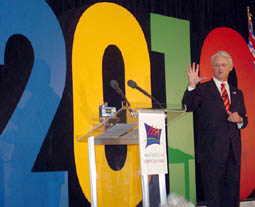
Tuesday's budget speech and the recent Speech from the Throne were full of references to the Spirit of 2010. But rather than setting out a plan to get B.C. in shape for the Olympics-just six years away-spending cuts in the budget take us in the opposite direction.
The 2004 budget achieves a central aim of the government: after three of the largest deficits in B.C. history, the budget is now balanced for the first time since 2000-'01. Over the past few years, the government has tried to backfill the hole carved in the budget from its 2001 personal and corporate income tax cuts with spending cuts and regressive tax increases (such as hikes in MSP premiums).
This is a budget balanced on a razor's edge, however. A $124 million accounting change moves the budget from the red to the black, and the usual cushions against unforeseen circumstances are much smaller than in previous years. A negative economic shock could easily tilt the budget back into the red. The balanced budget also benefits from one-time revenues due to the sale of BC Rail and higher BC Hydro rates.
Besides the balancing act, the pain of spending cuts is what stands out most in this year's budget. New spending cuts of $350 million are included in the budget, bringing the total spending cut outside health care and education to $1.9 billion since 2001-'02.
The province's most vulnerable will bear most of this load due to the large cuts in social services, in particular cuts to social assistance and to children and family services. Environmental protection, policing and courts, and transportation are also taking big hits to their budgets.
The cheque is in the mail
In health care and education, new money has been promised, but most of it does not come on line until 2006-'07, after the next election. In the meantime, cost pressures continue to mount that will lead to real reductions in service levels.
Low-income students will also be hurt by this budget. The elimination of the provincial grants program will lead to even higher debt loads for students, while universities and colleges will use this money for purposes of their choosing. The budget also estimates tuition increases of eight per cent per year for the next three years.
All of this is bad news for a province that has a lot of work to do before 2010. Because "the world will be watching," it is imperative we think hard about what it is that we want the world to see. In February 2010, gorgeous mountain vistas may be hard to come by, leaving rainy cityscapes that are not all "ready for prime time."
Vancouver's Downtown Eastside is but a short walk away from the planned convention centre, where media from around the world will gather. Social agencies report a doubling of homelessness in the past couple of years-a situation that will only be made worse by the 2004 budget cuts.
The 2010 backdrop may not be pretty
Imagine British or American network producers doing a feature story on the host town: what will they put on camera for the world to see? If those images are of a Vancouver ravaged by poverty and homelessness, crippled by traffic congestion, or in the middle of an environmental controversy, any efforts to promote the city or province will be seriously blighted.
Despite the cutbacks of the past two and a half years, when it comes to the Olympics, the provincial government seems to understand that government spending creates jobs and is good for the economy.
So rather than cutting spending in order to meet arbitrary constraints like balanced budget legislation, B.C. needs the public sector to step up and make new investments-in the people of the province, in transportation infrastructure and in affordable housing.
The Olympics have broader strategic significance as an opportunity to envision and create the B.C. we want. A truly "world class" performance should demonstrate a diverse, advanced, compassionate society based on principles of social justice and environmental sustainability-something that is a far cry from B.C. in 2004.
To pay for new public investments, however, we will have to pay higher taxes. The budget shows that personal and corporate income-tax revenues will continue to be below their pre-tax cut levels, even by 2006-'07. We need to restore tax revenues to fund needed expenditures.
B.C.'s business community pushed long and hard for the 2010 Olympics. Now it is time to put the money on the table. Instead of calling for even more tax cuts, B.C. businesses should get behind a public investment plan that enhances quality of life and makes the province truly realize the Spirit of 2010.
Marc Lee is an economist in the B.C. Office of the Canadian Centre for Policy Alternatives. The centre's 2004 BC Solutions Budget is available at http://www.policyalternatives.ca/.
![]()















Tyee Commenting Guidelines
Comments that violate guidelines risk being deleted, and violations may result in a temporary or permanent user ban. Maintain the spirit of good conversation to stay in the discussion.
*Please note The Tyee is not a forum for spreading misinformation about COVID-19, denying its existence or minimizing its risk to public health.
Do:
Do not: